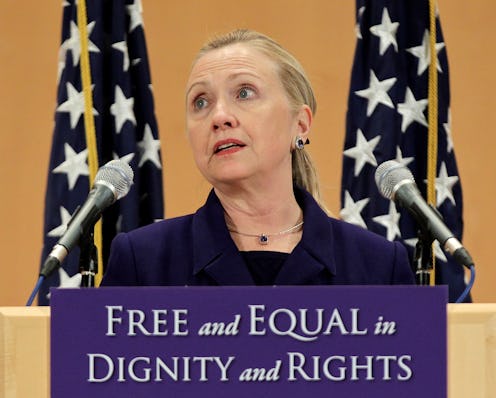News
HRC Endorses Clinton For Her LGBT Record, But ...
On Tuesday, Sec. Hillary Clinton's campaign received big news: the Human Rights Campaign officially endorsed Clinton for president. Their statement on the endorsement reports that the 32 community leaders on the HRC's Board of Directors voted unanimously on the decision after receiving questionnaire responses from each Democratic candidate and reviewing the records of Republican candidates (none of whom returned the HRC's questionnaire). In their statement, HRC cited both Clinton's "long record as a champion for LGBT rights" as well as the fact that:
Secretary Clinton ... recently unveiled the most robust and ambitious LGBT plan any candidate for president has ever laid out ... [H]er detailed LGBT policy platform specifically calls for dropping the ban on open transgender military service, outlawing dangerous "conversion therapy" for minors ... among other proposals that would advance equality and support the LGBT community.
If you only look at the campaign websites of Clinton and Sen. Bernie Sanders, Clinton's main rival for the Democratic nomination, the HRC's decision seems well justified. Sanders' campaign website lists LGBT equality as one of his primary issues, but the page on the issue is little more than a seven-item list containing no more than one sentence each. This looks rather shoddy compared to Clinton's LGBT equality plan, which consists of a six-item list with 18 bullet points and a full paragraph for each detailing not just what needs to be done, but why and how. However, the decision to endorse Clinton becomes a bit stickier when it comes to comparing the candidates' track records on LGBT rights.
Most of the stickiness hinges on marriage equality — certainly not the only LGBT issue out there, but important nonetheless. The Defense of Marriage Act (DOMA), signed into law by President Bill Clinton in 1996, barred same-sex couples from federal marriage protections. Hillary Clinton cannot and should not be held responsible for her husband's actions, but she did speak out publicly against marriage equality several times between the signing of DOMA and her 2008 presidential bid. Hillary Clinton's track record on marriage equality was pretty bleak in those years, including claims that civil unions were sufficient, that she personally believed marriage to be "a sacred bond between a man and a woman," and that the matter should be left up to states.
In 2013, Clinton unveiled her support for marriage equality in a video released by the Human Rights Campaign. She later told NPR's Terry Gross in June 2014 that her opinion had "evolved," along with the American public's. Pew Research Center reports that, in 2001, 57 percent of Americans opposed legalizing same-sex marriage, whereas in 2015, that sentiment switched, and 55 percent approved of legalizing it.
Where did Sanders stand during all this time? Politifact noted that Sanders expressed support for gay rights as mayor of Burlington in 1983 and worked for an anti-discrimination housing ordinance protecting gays and lesbians. But his record isn't exactly pristine. Slate's Mark Joseph Stern pointed out a number of weak spots in Sanders' record on LGBT issues.
Even though he was one of the only 67 members of the House to vote against DOMA (compared to 342 votes in favor), Stern noted that Sanders' chief of staff said the vote was based on Sanders' belief that it was opening up a "Pandora's box" by allowing a state to simply ignore the laws of another (such as the legality of a marriage) if it didn't like them. Stern wrote that this explanation could have been a way to stand up for same-sex rights without upsetting anti-gay voters.
Another area for potential criticism on Sanders' record Stern discussed is the fact that he was quoted in 2006 as saying that he was opposed to proposing same-sex equality in Vermont. At the time, Sanders told the Barre/Montpelier, Vermont, newspaper The Times Argus: "Not right now, not after what we went through." This was a reference to passing civil unions in Vermont in 2000. Vermont was the first state to do so. At the time, the issue was tremendously divisive.
Sanders did go on to support the Marriage Equality Act in Vermont, which made Vermont the fourth state in which same-sex couples could legally marry in 2009. He is also a co-sponsor of the Equality Act, which would offer federal protections against housing, employment, education, and credit discrimination on the basis of sexual orientation or gender identity.
Comparing the records of Clinton and Sanders on at least one issue of LGBT rights, Sanders comes out on top. It would seem that, for the HRC, a detailed plan now was more important than a more consistent record of working for LGBT equality over the past couple decades.
